Here comes Dai Burger – a fabulous antidote to misery
“Yeah, I have a spunk to me. I have an edge to me. I’m from Queens.”
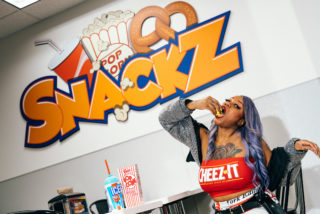
“Yeah, I have a spunk to me. I have an edge to me. I’m from Queens.”
I meet Dai Burger outside a monochrome hipster café (my choice) in Williamsburg, Brooklyn, on the second day of 2020. The café is playing ’90s RnB and serving egg-white omelettes with roasted tomatoes. Already, the New Year feels pretty grim – fires burning up Australia, floods in East Africa, stirrings of unrest in the Middle East. Even the unseasonable blue sky is foreboding: a reminder of impending climate catastrophe spread all out across the great grey New York winter. But then there’s Dai, standing on the street like an antidote to the misery, in her black tracksuit with flashes of primary colour, jewelled nails and hair a shade of purple somewhere between your great nana’s blue rinse and a Groovy Grape flavoured Hubba Bubba. She orders a green tea, and we sit down to chat.
Dai is (and there’s not another word for it, I’ve spent fifteen minutes browsing an online thesaurus) fabulous. I love her within seconds of the interview starting, and not just because I really need something to hold onto amid the relentless bad news. She’s literally colourful, like a kindergarten mural, dressed down but styled perfectly – matte gold eye shadow and sweeping liner pulling the whole look together with an unexpectedly delightful flourish that can only come from someone who knows what she’s doing when it comes to fashion. “I’m not afraid to be weird,” Dai says, describing her approach to self-styling. “Weird works. It took a little figuring out in the beginning, but we got past that.”
This ability to pull off a look is the result of seven years working under the legendary designer Patricia Field (of Sex and the City and The Devil Wears Prada fame), styling visitors to Field’s infamous lower East Side boutique store. It’s a time Dai describes as formative – both in the sense of refining her fashion skills and in developing the sensibility that has come to shape her approach to music.
“We had LGBTQ friendly clothing sizes and everything. You could come and you could leave a brand new person. And even if you have five dollars we’d find something for you. It was a place of treasures. I worked there for a while and that kind of shaped who I am. Because she’s so amazing, I learned a lot of things in fashion behind the scenes too. Merchandising, visualising – I put the eye for fashion, colours, into the music. You gotta look good while you’re talking about feeling good. You got to, you know, put it out there for people to understand. Look good, do good, feel great. I throw it all in there. It’s fun. I like having fun. People used to come and see me at the store. And they knew there was cool music, and I’ll help you get dressed for the night. It was like a perfect place, a spectacle. And then I took it on the road.”
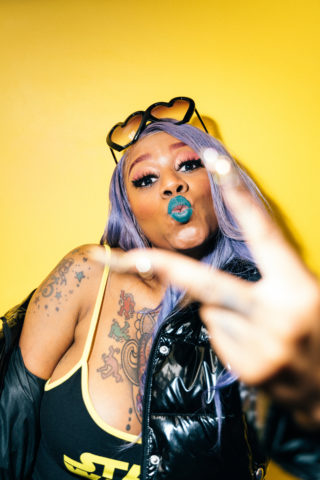
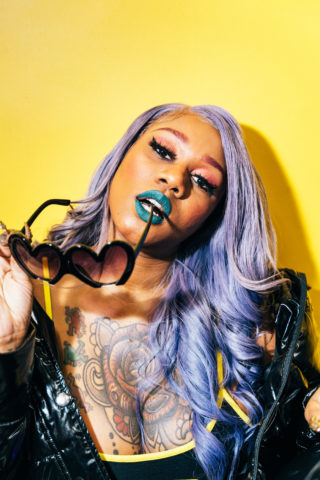
We’re here to discuss that journey, the latest stop on which is the release of Dai’s second album, Bite the Burger (following 2017’s Soft Serve) – the cheeky, playful title encapsulating the queer aesthetic of the music. Dai is heavily influenced by the Baltimore club scene, known for its mash up of hip hop and house and its queer-embracing, any-thing-goes energy. For Dai, queerness undercuts all aspects of her work and life. “People know I’ve dated females. I’ve had boyfriends in the past-past. That’s who I am. It’s part of the culture, that’s how I came up. I can’t pretend to be anything else but that, so you know, it comes across in the music. I talk my shit about whoever I want and I do whatever I want. I like queer because it’s an umbrella, more than it identifies one thing. I don’t have to, you know, choose a letter. It’s a nice umbrella to just still be unlabelled in a labelled margin. I’m chillin’. Just know I’m bout this life, this is where I stand.”
So, I ask, does queerness have a sound? She smiles, takes a sip of her tea.
“It’s about identity but it does somewhat have a sound. My stuff, it’s underground derived. I have producers from Baltimore, the Baltimore club scene, so that sound helps infuse … like house beats, vogue beats, things like that so there is a [queer] sound. It is a culture behind it. It does embody that, because that’s the source: those drums, that underground house tone. People like that, people like to dance. [Queer] is a sound but it’s also intermeshed, because you can dance to it, anyone can dance to it, you don’t have to identify like this to know good music when you hear it. It’s good music man.” Dai laughs. “People like that – like the rawness mixed with the club beats, it’s good. We love it.”
And if people do seem to love Dai, it’s not hard to work out why. She’s a skilled and respected musician with growing international acclaim – headlining at the DICE festival in Berlin (“they have a great respect for the music out there. So if we get the Berlin approval I know this is good”), and embarking on college tours across the States. She’s just a really likeable person too; humble, generous and kind, peppering the interview with references to projects her friends are doing – TT the Artist’s Dark City Baltimore documentary, and her collaborations with “legend in the making” producer Mighty Mark.
Her humbleness is the result of having to work hard, and for a long time, before gaining any recognition. Dai began making music in 2011, having worked as a backup dancer for Lil Mama before deciding to take the leap into music making herself. And it was an underground hustle for years before she began to break through. She describes dancing at raves with friends, building up a following, before bigger opportunities opened up avenues in the mainstream.
This slow burn has meant she has honed her public persona in a way that’s allowed her to stay true to who she is. “Yeah. I have a spunk to me, I have an edge to me. I’m from Queens. I had my childhood. It wasn’t super tough, but it wasn’t super easy, I still had to figure stuff out, being a young black girl, like who’s a little different at times too. I used to wear a Mohawk and certain makeup and people thought I was fashionable, but I’ve always been just a little different. And that’s ok.
“When I first started I would meet people who would see what I was doing, and they’d be like, ‘let’s work together, but maybe you should tone this down, or try that, or you should be a little more this, or a little more that,’ and it’s like, ‘Errr: I wanna be what this is right now.’ I have evolved, yes, but at my own speed. Not because someone steered me in a certain direction. I’ve always stayed true to just being myself. So just dealing with likeminded people who see the vision. And changing as I see fit, not because I’ve been told to. I don’t care what your vision is, this is my vision.”
It’s a vision whereby Dai remains totally and unashamedly herself, but also committed to giving back. This is epitomised by her ‘Where My Girls’ programme, after her popular song of the same name, through which she works with young women across New York, teaching them music making skills as part of an outreach imitative run through her studio. “I like to give back and be a mentor of sorts, because I didn’t have a mentor. Or big sister, big cousin or anything, so it’s a group, ages nine through eleven, just offering what I know, showing different avenues, different routes in music.” ‘Where My Girls’, she tells me, was also inspiration for another friend’s documentary of the same name – “I’m one of three featured in it,” she says.
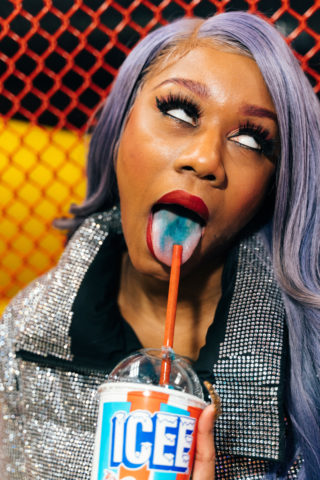
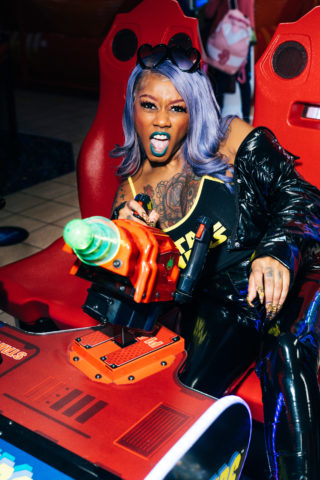
If there’s a politics to what Dai chooses to spend her time on, then it’s a politics steeped in fun; one with music at its core.
“I really love music so my albums they play through like that. So you can just like start at the beginning and play through. So you go through the upbeat, then I’ll have a couple of like RnB-, ’90s-inspired tracks, then I’ll bring it back up again. Then I kinda have a full on club track. I kinda like to post through the genres, meld them together so it’s not jarring to hear one from the other. I think I found a good medium where I get to play with all the genres. It’s not political, it’s just derivative of my mind, like when I do the brainstorming with the girls I’m like, ‘What do you like? What are you guys doing? Yell some words out! What are some awesome words?’. And then they’ll say an awesome word and it’ll be like, ‘Oh, cool roller-skate, let’s talk about why you like roller-skating,’ and then it turns into a song. Like pulling these ideas that are really around you anyway. I’ll talk about going to these parties; that’s really, ‘this is what we do, we’re getting ready, how do you feel?’ Or, I dunno, because is it about the depth or a good message, or an overall something that people can relate to?” She points at her half-empty cup. “Like, green tea. I can do a song that’s like, ‘sipping on my green tea’, and you know somebody might like that, they’re sipping on they green tea… just a moment. I like capturing moments. It feels political because you’re speaking to your higher self, but I don’t have a full on political message, except be yourself, which is a politic in itself.